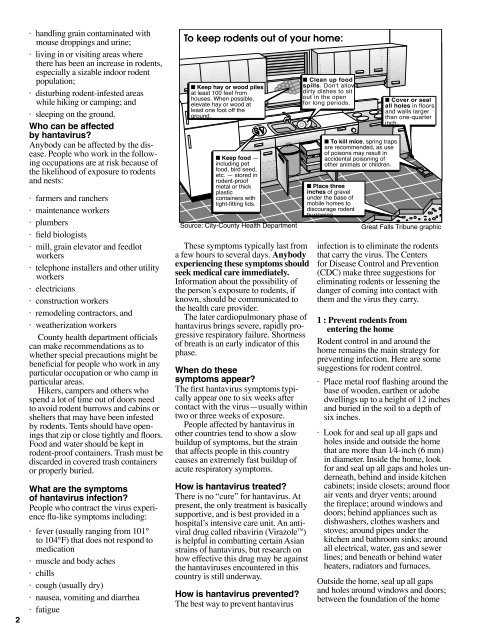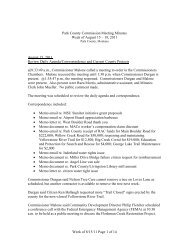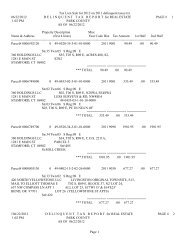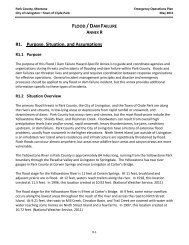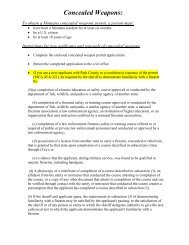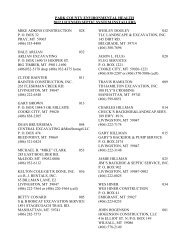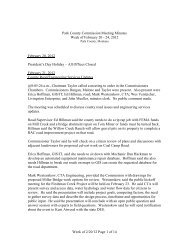Hantavirus Information - Park County
Hantavirus Information - Park County
Hantavirus Information - Park County
Create successful ePaper yourself
Turn your PDF publications into a flip-book with our unique Google optimized e-Paper software.
2<br />
· handling grain contaminated with<br />
mouse droppings and urine;<br />
· living in or visiting areas where<br />
there has been an increase in rodents,<br />
especially a sizable indoor rodent<br />
population;<br />
· disturbing rodent-infested areas<br />
while hiking or camping; and<br />
· sleeping on the ground.<br />
Who can be affected<br />
by hantavirus?<br />
Anybody can be affected by the disease.<br />
People who work in the following<br />
occupations are at risk because of<br />
the likelihood of exposure to rodents<br />
and nests:<br />
· farmers and ranchers<br />
· maintenance workers<br />
· plumbers<br />
· field biologists<br />
· mill, grain elevator and feedlot<br />
workers<br />
· telephone installers and other utility<br />
workers<br />
· electricians<br />
· construction workers<br />
· remodeling contractors, and<br />
· weatherization workers<br />
<strong>County</strong> health department officials<br />
can make recommendations as to<br />
whether special precautions might be<br />
beneficial for people who work in any<br />
particular occupation or who camp in<br />
particular areas.<br />
Hikers, campers and others who<br />
spend a lot of time out of doors need<br />
to avoid rodent burrows and cabins or<br />
shelters that may have been infested<br />
by rodents. Tents should have openings<br />
that zip or close tightly and floors.<br />
Food and water should be kept in<br />
rodent-proof containers. Trash must be<br />
discarded in covered trash containers<br />
or properly buried.<br />
What are the symptoms<br />
of hantavirus infection?<br />
People who contract the virus experience<br />
flu-like symptoms including:<br />
· fever (usually ranging from 101°<br />
to 104°F) that does not respond to<br />
medication<br />
· muscle and body aches<br />
· chills<br />
· cough (usually dry)<br />
· nausea, vomiting and diarrhea<br />
· fatigue<br />
To keep rodents out of your home:<br />
■ Keep hay or wood piles<br />
at least 100 feet from<br />
houses. When possible,<br />
elevate hay or wood at<br />
least one foot off the<br />
ground.<br />
■ Keep food —<br />
including pet<br />
food, bird seed,<br />
etc. — stored in<br />
rodent-proof<br />
metal or thick<br />
plastic<br />
containers with<br />
tight-fitting lids.<br />
Source: City-<strong>County</strong> Health Department<br />
These symptoms typically last from<br />
a few hours to several days. Anybody<br />
experiencing these symptoms should<br />
seek medical care immediately.<br />
<strong>Information</strong> about the possibility of<br />
the personʼs exposure to rodents, if<br />
known, should be communicated to<br />
the health care provider.<br />
The later cardiopulmonary phase of<br />
hantavirus brings severe, rapidly progressive<br />
respiratory failure. Shortness<br />
of breath is an early indicator of this<br />
phase.<br />
When do these<br />
symptoms appear?<br />
The first hantavirus symptoms typically<br />
appear one to six weeks after<br />
contact with the virus—usually within<br />
two or three weeks of exposure.<br />
People affected by hantavirus in<br />
other countries tend to show a slow<br />
buildup of symptoms, but the strain<br />
that affects people in this country<br />
causes an extremely fast buildup of<br />
acute respiratory symptoms.<br />
How is hantavirus treated?<br />
There is no “cure” for hantavirus. At<br />
present, the only treatment is basically<br />
supportive, and is best provided in a<br />
hospitalʼs intensive care unit. An antiviral<br />
drug called ribavirin (Virazole TM )<br />
is helpful in combatting certain Asian<br />
strains of hantavirus, but research on<br />
how effective this drug may be against<br />
the hantaviruses encountered in this<br />
country is still underway.<br />
How is hantavirus prevented?<br />
The best way to prevent hantavirus<br />
■ Clean up food<br />
spills. Don't allow<br />
dirty dishes to sit<br />
out in the open<br />
for long periods.<br />
■ To kill mice, spring traps<br />
are recommended, as use<br />
of poisons may result in<br />
accidental poisoning of<br />
other animals or children.<br />
■ Place three<br />
inches of gravel<br />
under the base of<br />
mobile homes to<br />
discourage rodent<br />
burrowing.<br />
■ Cover or seal<br />
all holes in floors<br />
and walls larger<br />
than one-quarter<br />
inch.<br />
Great Falls Tribune graphic<br />
infection is to eliminate the rodents<br />
that carry the virus. The Centers<br />
for Disease Control and Prevention<br />
(CDC) make three suggestions for<br />
eliminating rodents or lessening the<br />
danger of coming into contact with<br />
them and the virus they carry.<br />
1 : Prevent rodents from<br />
entering the home<br />
Rodent control in and around the<br />
home remains the main strategy for<br />
preventing infection. Here are some<br />
suggestions for rodent control.<br />
· Place metal roof flashing around the<br />
base of wooden, earthen or adobe<br />
dwellings up to a height of 12 inches<br />
and buried in the soil to a depth of<br />
six inches.<br />
· Look for and seal up all gaps and<br />
holes inside and outside the home<br />
that are more than 1⁄4-inch (6 mm)<br />
in diameter. Inside the home, look<br />
for and seal up all gaps and holes underneath,<br />
behind and inside kitchen<br />
cabinets; inside closets; around floor<br />
air vents and dryer vents; around<br />
the fireplace; around windows and<br />
doors; behind appliances such as<br />
dishwashers, clothes washers and<br />
stoves; around pipes under the<br />
kitchen and bathroom sinks; around<br />
all electrical, water, gas and sewer<br />
lines; and beneath or behind water<br />
heaters, radiators and furnaces.<br />
Outside the home, seal up all gaps<br />
and holes around windows and doors;<br />
between the foundation of the home


